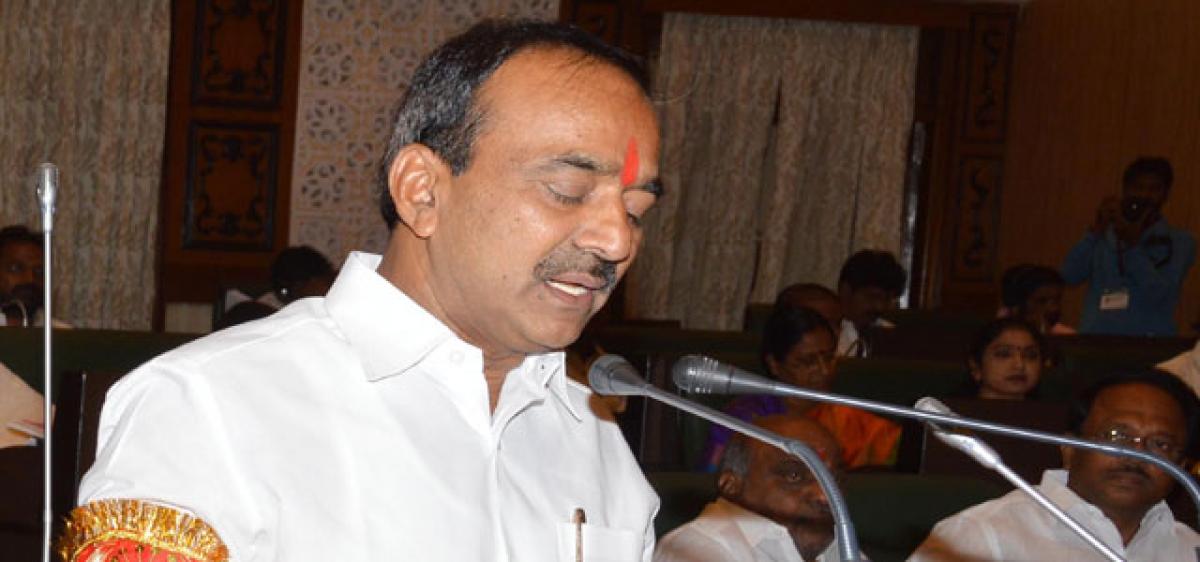Live
- Akanksha loses to Malaysian in last 8
- Gukesh crushes Abasov to be back in joint lead
- 'Everyone's nerves got tested; Ashutosh was unbelievable', says Pandya
- Kandikunta Venkataprasad gets support at election campaign in Gandlapenta mandal
- Meta introduces most capable Llama 3 AI model
- Having a driving skill highly desirable for job seekers
- Former MLA Katamreddy Vishnu Vardan Reddy Campaigns in Support of Mekapati Rajanna's Victory in Chamdala
- Golf: Field announced for 2024 China Open as DP World Tour returns to Shenzhen
- Man reported dead after self immolation near court during ex-US Prez Trump's trial
- Mahabubabad: KCR cut a deal with Modi to save Kavitha says Revanth
Just In

Endowed with fiscal momentum post bifurcation, Telangana Finance Minister presented his budget estimates that saw an allocation of over Rs 88,000 crore for development expenditure. However, realisation of this expenditure is incumbent upon ambitious central fiscal transfers contemplated, apart from increased accruals from state’s own tax revenues.
Endowed with fiscal momentum post bifurcation, Telangana Finance Minister presented his budget estimates that saw an allocation of over Rs 88,000 crore for development expenditure. However, realisation of this expenditure is incumbent upon ambitious central fiscal transfers contemplated, apart from increased accruals from state’s own tax revenues.
The healthy feature of the budget is development outlays surpassing committed expenditure. But, there has been a 14 per cent fall in revised expenditure for the current fiscal. The Finance Minister has his task clearly cut out in terms of maintaining the sanctity of the expenditure budgeted.
However, growing debt burden and a fiscal deficit pegged at Rs 26,000 crore are a matter of some concern. The state can overcome these challenges with buoyant growth and increased revenues.
Irrigation continues to be the top priority in the budget estimates. But, the gap between estimates and spending is worrisome. Still, the allocations for this vital sector in Telangana match those of the united Andhra Pradesh, which deserves appreciation.
The budget rightly focuses on rural economy, especially, reviving the livelihoods of those who depend on traditional occupations who constitute the major chunk of backward classes. It’s appreciable that the budget specifically targets the Most Backward Castes (MBCs).
The allocations for agriculture do not match the enunciated commitment to revamp this sector. Excluding the allocations for loan waiver, the outlays for farming sector are largely inadequate.
The budget proposes a slew of initiatives for the revival of allied sectors. These sectors like dairy, fisheries, etc., provide sustainable rural incomes. However, a coherent economic policy needs to be put in place, apart from a budgetary push, to re-vitalise the communities whose livelihoods became vulnerable to modern economic development.
The tardy progress in the implementation of flagship schemes like two-bed room houses and land for landless dalits should be checked. Comprehensive implementation of KG-to-PG free education still remains elusive, though expanding facilities in residential stream to the children of marginalised families is a welcome feature.
In an electoral democracy, any government is obligated to implement welfare schemes. The Government of Telangana is not lagging behind in providing relief to several sections through its populist schemes. The increased amount under Kalyan Lakshmi scheme is one such instance.
State governments have fiscal limitations. The impact of demonetisation, implementation of GST etc., make the estimates unpredictable. Within the fiscal limitations, Finance Minister tried hard to balance competing interests.
Containing looming fiscal deficit, reducing debt burden remain fiscal challenges. Greater fillip to schemes like housing, free education, land to the dalits deserve immediate attention. Human development needs much greater focus to harness the demographic dividend.
The outlays should translate into outcomes. Improved governance and efficiency in public administration can deliver this. A host of non-fiscal measures can complement the fiscal efforts of the Finance Minister.
The state has immense potential. The economy is on the growth path. Revenues are upbeat. Political leadership is strong and stable. Fiscal and economic policies should be dovetailed with other public policies to usher in a resurgent and vibrant Telangana.

© 2024 Hyderabad Media House Limited/The Hans India. All rights reserved. Powered by hocalwire.com







